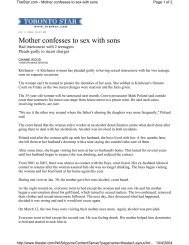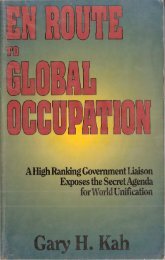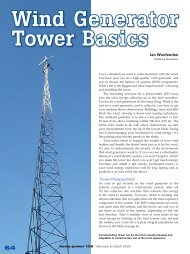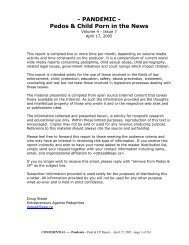G. Edward Griffin - The Fearful Master - PDF Archive
G. Edward Griffin - The Fearful Master - PDF Archive
G. Edward Griffin - The Fearful Master - PDF Archive
Create successful ePaper yourself
Turn your PDF publications into a flip-book with our unique Google optimized e-Paper software.
Gentlemen, I am sure you all join me in welcoming to this country the<br />
guest of honor and the members of his government. . . . <strong>The</strong> difficulties<br />
of our revolutionary experience, and the experiences of every other<br />
people coming into independence since the end of World War II, pale in<br />
comparison to the problems which the Congo has faced and which<br />
press upon the prime minister and his supporters. What makes him<br />
especially welcome is the courage and the fortitude, the persistence and<br />
the judgment with which he has met these challenges--which would<br />
have overwhelmed a lesser people, a lesser country, a lesser man, a<br />
lesser government. Prime Minister, we welcome you here for many<br />
reasons. <strong>The</strong> success of the Congo is tied up, really, we believe, with<br />
the success of the UN. If you fail and the Congo should fail, it would be<br />
a serious blow for the UN, upon which this country has placed so many<br />
hopes for the last 17 years . . . . 19 NOTES<br />
1. "Indian Communists Back Nehru Position," Daily Worker (June 30,1955), p. 2.<br />
2. Senator Thomas Dodd, Congressional Record (September 22, 1961).<br />
3. Schuyler, p. 240. On July 17, 1961, a small patrol of Katangese soldiers removing a-<br />
UN roadblock were fired on by UN troops. Two Katangans were killed and the rest fled<br />
into the bush. In anger, Interior Minister Munongo called a press conference and, pointing<br />
his remarks at the lack of support for Katanga from the United States, threatened to call<br />
on Soviet Russia for assistance. No one took it seriously, however, least of all the Soviets.<br />
Radio Moscow replied by calling Munongo and Tshombe "lackies and murderers with<br />
blood-stained hands." Even-Conor O'Brien admitted that in the West, Munongo's<br />
statement was a windfall for politicians who were under fire from the so-called right wing<br />
for betraying anti-Communist Katanga. Nevertheless, in Elisabethville and throughout<br />
Katanga, posters showing an African with a spear and a map of Katanga, and the words<br />
"Katanga, shield of Africa against Communism" remained in place. Munongo had lost his<br />
temper but aside from that, life went on as before.<br />
4. Senator Thomas Dodd, Congressional Record (September 8, 1961). Also, O'Brien, pp.<br />
96, 99.<br />
5. Hempstone, p. 134.<br />
6. Ibid., pp. 134-139. Also, O'Brien, p. 98.<br />
7. Hempstone, pp. 143-147. Also, O'Brien, pp. 99, 127.<br />
8. O'Brien, p. 115.<br />
9. Presence Africaine (December 28, 1957). As quoted by Michel Sturdza, World<br />
Government and International Assassination (Belmont, Mass., American Opinion, 1963),<br />
p. 11.<br />
10. Senator Thomas Dodd, Congressional Record (August 3, 1962).<br />
11. Schuyler, p. 268.


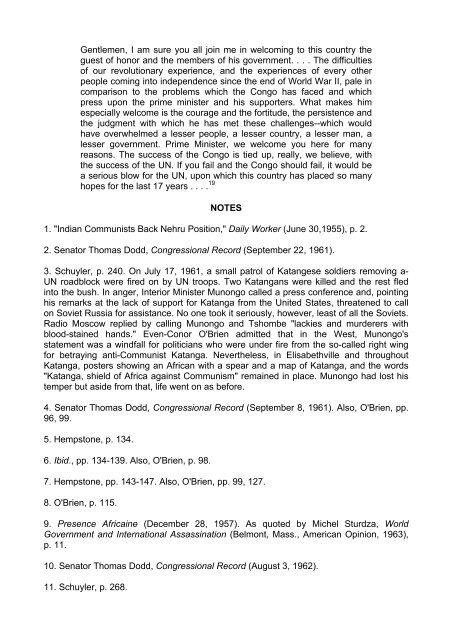
![Robert T McQuaid [rtmq@stn.net] Sent: Friday, October 29, 2004 12 ...](https://img.yumpu.com/51070071/1/190x245/robert-t-mcquaid-rtmqstnnet-sent-friday-october-29-2004-12-.jpg?quality=85)



